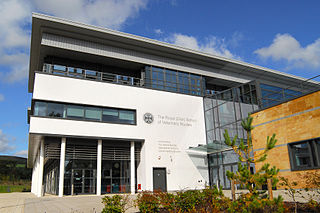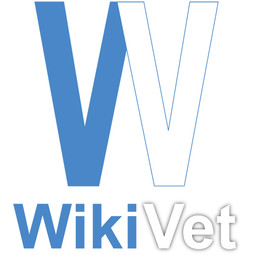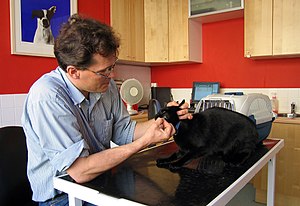
Veterinary medicine is the branch of medicine that deals with the prevention, management, diagnosis, and treatment of disease, disorder, and injury in non-human animals. The scope of veterinary medicine is wide, covering all animal species, both domesticated and wild, with a wide range of conditions that can affect different species.

A veterinarian (vet) is a medical professional who practices veterinary medicine. They manage a wide range of health conditions and injuries in non-human animals. Along with this, veterinarians also play a role in animal reproduction, health management, conservation, husbandry and breeding and preventive medicine like nutrition, vaccination and parasitic control as well as biosecurity and zoonotic disease surveillance and prevention.

The Royal Veterinary College is a veterinary school located in London and a member institution of the federal University of London. The RVC was founded in 1791 and joined the University of London in 1949. It is the oldest and largest Veterinary school in the United Kingdom, and one of only 11 in the country where students can study to become a vet.
The Royal College of Veterinary Surgeons (RCVS) is the regulatory body for veterinary surgeons in the United Kingdom, established in 1844 by royal charter. It is responsible for monitoring the educational, ethical and clinical standards of the veterinary profession. Anyone wishing to practice as a vet in the United Kingdom must be registered with the RCVS.
A veterinary specialist is a veterinarian who specializes in a clinical field of veterinary medicine.

The U.S. Army Veterinary Corps is a staff corps of the U.S. Army Medical Department (AMEDD) consisting of commissioned veterinary officers and Health Professions Scholarship Program (HPSP) veterinary students. It was established by an Act of Congress on 3 June 1916. Recognition of the need for veterinary expertise had been evolving since 1776 when General Washington directed that a "regiment of horse with a farrier" be raised. It has evolved to include sanitary food inspectors and animal healthcare specialists.

The Royal (Dick) School of Veterinary Studies, commonly referred to as the Dick Vet, is the University of Edinburgh's vet school. It is part of the College of Medicine and Veterinary Medicine.
The Bachelor of Veterinary Science, "Bachelor of Veterinary Medicine" (BVetMed), or "Bachelor of Veterinary Medicine and Surgery" is a degree for studies in veterinary medicine in the United Kingdom, Australia, and several other countries outside the United States and Canada. These degrees qualify one to practice as a veterinarian in the US if the degree is conferred from an American Veterinary Medical Association (AVMA) accredited school and the candidate passes the North American Veterinary Licensing Examination (NAVLE), just as any other US and Canada graduate. They are equivalent to DVM/VMD degrees; the main equalizer being licensure in the US. On 5 March 2015, the Royal College of Veterinary Surgeons (RCVS) Council made the decision to allow UK veterinarians to use the courtesy title "doctor", to align with international practices. The RCVS president said of the change: “Whether one regards the decision as correcting a historical anomaly or simply providing greater clarity at home and abroad, there is no doubt that the issue has generated huge interest".
The Faculty of Veterinary Science is a faculty of the University of Pretoria. Founded in 1920, it is the second oldest veterinary faculty in Africa. With the exception of the faculties in Khartoum, and Cairo, all the other African faculties were established after 1960. It is the only one of its kind in South Africa and is one of 33 veterinary faculties in Africa.
The British Veterinary Association (BVA) is the national body for veterinary surgeons in the United Kingdom and is a not-for-profit organisation. Its purpose is that of knowledge dissemination, and not professional validation or academic competence. Knowledge dissemination is important in the veterinary profession to prevent a knowledge divide.

WikiVet is a wiki of veterinary content based on the MediaWiki platform. The website is a collaborative initiative between various veterinary schools, and its content covers the entire veterinary curriculum. WikiVet is part of the WikiVet Educational Foundation.
The Royal College of Veterinary Surgeons Charitable Trust is a British charity that assists veterinarians and veterinary nurses with grants and a specialist library.

A paraveterinary worker is a professional of veterinary medicine who performs procedures autonomously or semi-autonomously, as part of a veterinary assistance system. The job role varies throughout the world, and common titles include veterinary nurse, veterinary technician, and veterinary assistant, and variants with the prefix of "animal health".
The role of veterinary nurses in Australia is to assist the veterinary surgeons in their duties, and to perform animal health-care activities to provide care for their patients.
Paraveterinary workers in Ireland, such as veterinary nurses, assist veterinary physicians, or carry out animal health procedures autonomously. Paraveterinary workers in Ireland have been represented by the Irish Veterinary Nursing Association (IVNA) since 2002, and prior to this were represented by the British Veterinary Nursing Association (BVNA) from the 1960s. The title "veterinary nurse" can only be used by those registered with the Veterinary Council of Ireland. The post-nominal letters used in Ireland are RVN.
Veterinary nurses (VNs) in South Africa attend a two-year program at the Onderstepoort campus of the University of Pretoria culminating in a diploma in veterinary nursing [DipVetNurs or DVN ] and unlike lay staff are trained to do everything except clinical consultations and surgery subject to the Para-Veterinary Profession's Act. Qualified veterinary nurses, curiously of both genders, utilize the title of "Sister (Sr.)", similar to the practice of female charge nurses in the human medical field in many countries, representing their professional sisterhood. They can be recognised by the wearing of epaulettes bearing a lamb, representing the patients they care for; a lamp, representing knowledge; and an axe, symbolising strength. They are represented by the Veterinary Nurses Association of South Africa (VNASA) which was started in 1978 after South Africa's first class of qualified veterinary nurses graduated. Permission to offer a Bachelor of Veterinary Nursing through the University of Pretoria was recently applied for to the South African Qualifications Authority; under consideration is the addition of one year of study to the current DipVetNurs program, converting the diploma to a degree. Other veterinary para-professionals found in South Africa include animal health technicians, laboratory animal technologists, and veterinary technologists.

Veterinary medicine in the United States is the performance of veterinary medicine in the United States, normally performed by licensed medical professionals, and subject to provisions of statute law which vary by state. Veterinary medicine is normally led by veterinary physicians, termed veterinarians or vets, but also by paraveterinary workers, such as veterinary technicians, and veterinary assistants. This can be augmented by other paraprofessionals with specific specialties, such as animal physiotherapy or dentistry, and species-relevant roles such as farriers.
StreetVet is a registered charity that offers free accessible vet care to pets belonging to those experiencing homelessness in the United Kingdom. The organisation provides support for homeless pet owners who cannot afford private veterinary treatment and educates them on the responsibilities and care of animal ownership.
Anna Louise Meredith is Professor of Conservation Medicine at the University of Edinburgh, where she has previously served as chairperson of zoological conservation medicine at the Royal (Dick) School of Veterinary Studies.
David Argyle BVMS DECVIM-CA (Oncology) FRSE FRSA FRCVS is Head of the College of Medicine and Veterinary Medicine at the University of Edinburgh.








